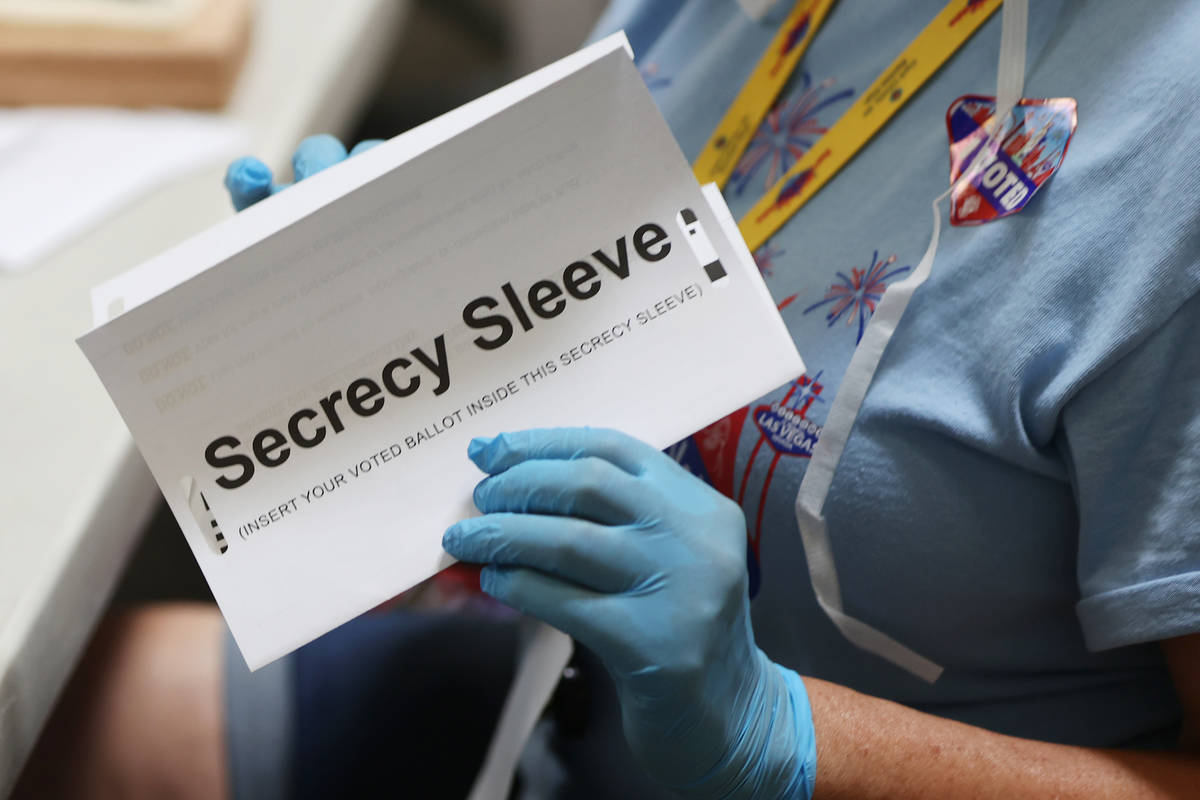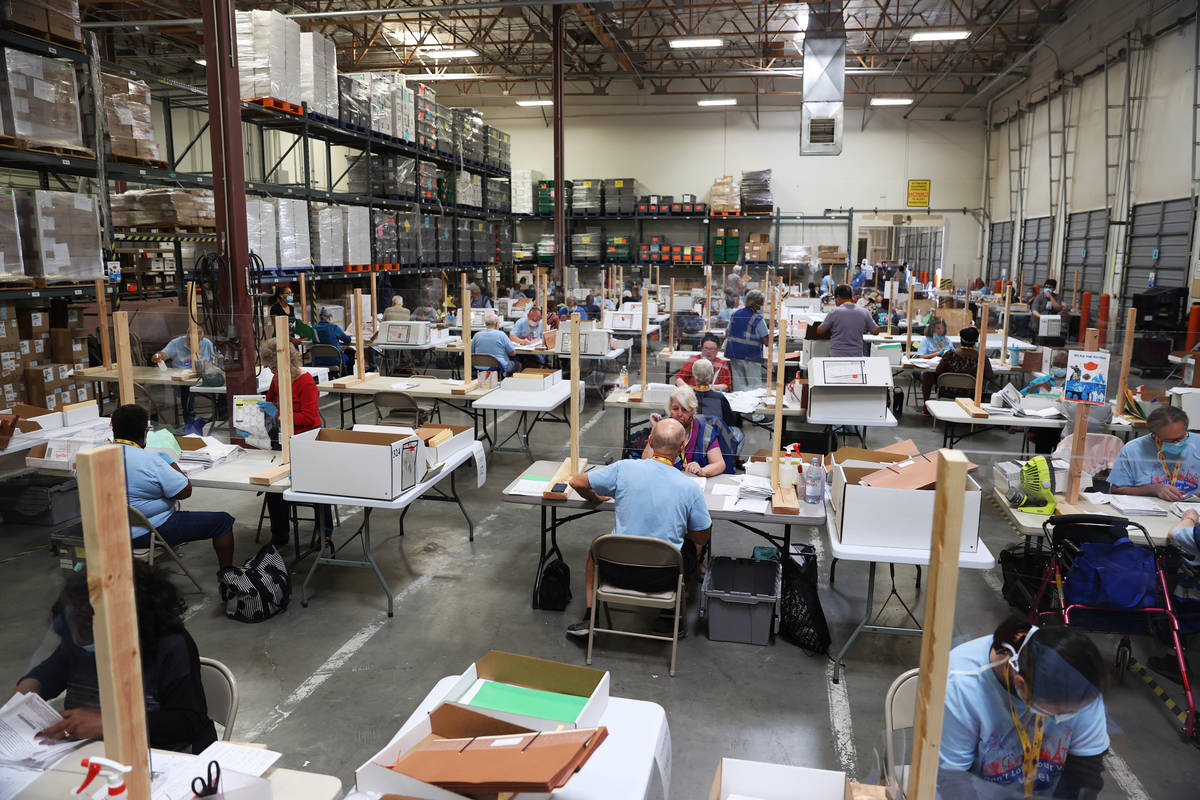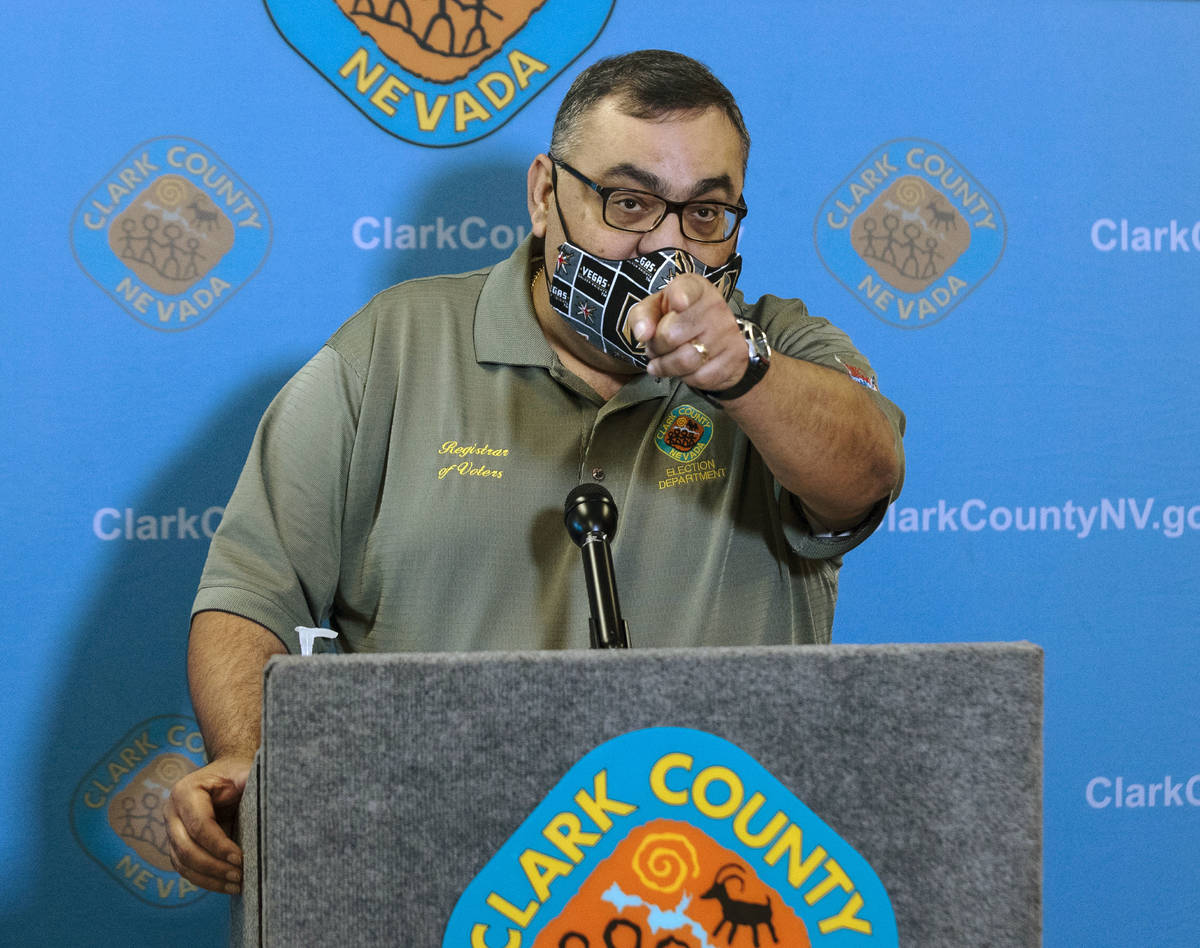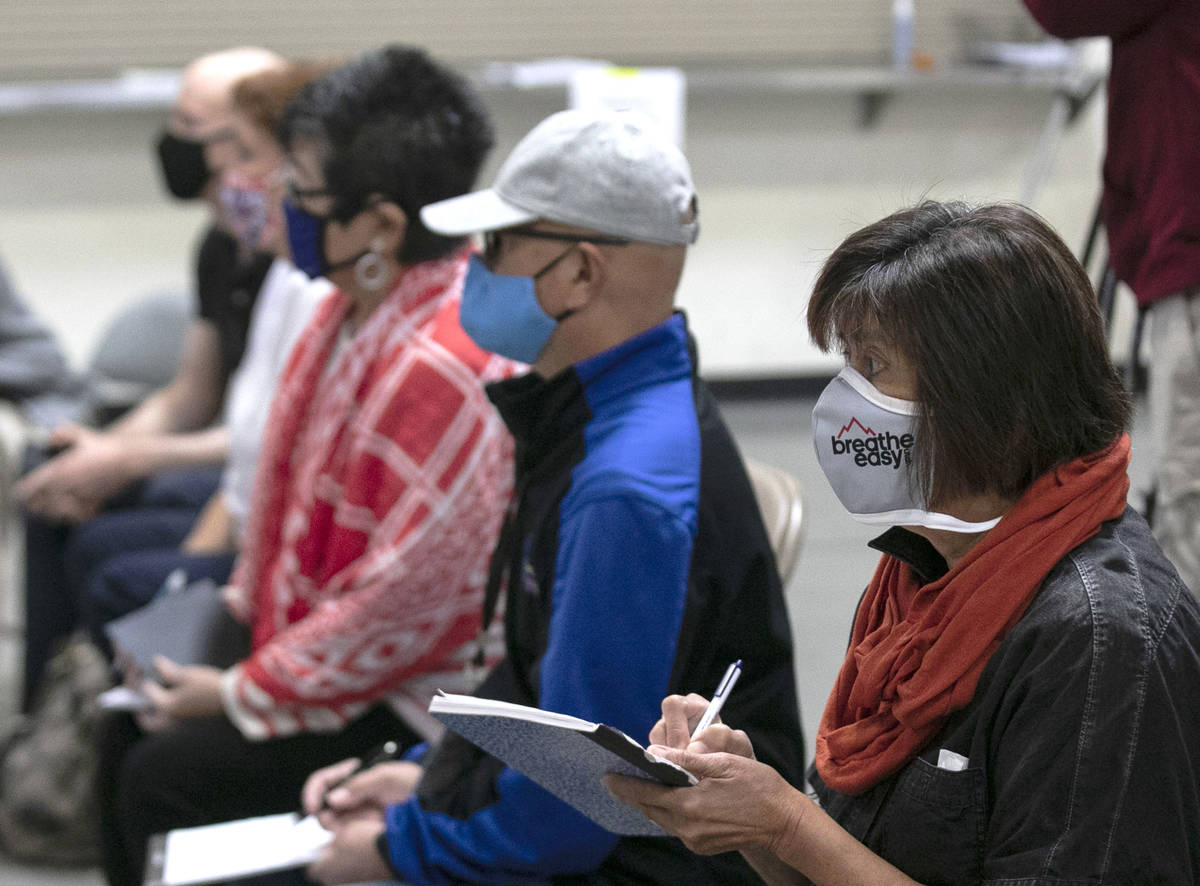Voter fraud unproven in Nevada, despite multiple Trump campaign claims
Supporters of President Donald Trump have used the state’s mailed ballots and a few allegations of fraud to claim that widespread voting impropriety helped tilt Nevada’s election to President-elect Joe Biden.
But a review of available facts and cases found few, if any, irregularities that could have swayed the results.
And Trump campaign officials, including state campaign co-chair and former Nevada Attorney General Adam Laxalt, repeatedly have refused to provide detailed information that would allow Review-Journal reporters to verify or debunk their fraud claims.
Officials working for Secretary of State Barbara Cegavske, a Republican, and the U.S. Department of Justice are looking into all credible “allegations of fraud” but both offices declined comment because of the ongoing investigations.
Nevada Democratic Party communications director Molly Forgey said Trump supporters have tried everything to overturn valid election results.
“The idea of widespread voter fraud is not based in reality and is just another attempt to suppress voter turnout,” she said. President-elect Joe Biden leads Trump in Nevada by nearly 37,000 votes with a few mail-in and about 60,000 provisional ballots yet to be counted. Trump supporters held a news conference Sunday alleging 9,000 fraudulent ballots may have been cast in the state.
“There is fraud,” Laxalt said Wednesday. “How much fraud? We don’t know.
“We need institutions to investigate this. We can poke around the edges and identify vulnerabilities, but we don’t have the resources to investigate every one of them. We are not an investigative body,” Laxalt said of the Trump campaign. “I’m telling you, there are improper votes. We don’t know if it’s 2,000, 10,000 or 40,000. I believe it is in the thousands.”
Republicans have also filed four lawsuits in Nevada, but so far the only success was a lawsuit to extend voting hours in 30 locations where machines malfunctioned on Election Day. Trump attorneys also agreed to dismiss a Nevada Supreme Court appeal Tuesday about signature verification and observers after reaching agreement with Clark County about additional access to one of the processing facilities.
UNLV associate political science professor Rebecca Gill said voter fraud is extremely rare in the United States and there is almost no expectation that fraud could significantly impact the Nevada vote totals for president.
“It makes sense voter fraud is not a very common crime,” she said. “When you commit voter fraud, you are committing a felony but the upside is so small because you, as an individual, have very little ability to shift the election.”
The American Civil Liberties Union of Nevada also said the fraud allegations are not credible.
“We’re hearing the same rhetoric as everyone else is, and we’re not hearing anything that makes us doubt the integrity of the election,” according to an emailed statement. “The entire country has seen how painstaking our process for counting votes is.”
Current Attorney General Aaron Ford, a Democrat, and his predecessor, Laxalt, got into a Twitter spat over the issue.
“Is the AG an impartial office that people are supposed to report voter fraud to for a legitimate investigation or has he already declared that a free and fair election was held?” Laxalt tweeted in response to a message from Ford.
Ford responded: “Adam, file an official complaint with your supporting evidence (a redacted affidavit won’t do). My office not only investigates claims of voter fraud, but we prosecute the rare ones that actually rises to that level. So, just file a complaint.”
The deadline for counting all ballots is Nov. 12. After that, the final canvass of the vote will happen on Nov. 16 when state officials review the results.
Dead voter claims
The Nevada secretary of state is investigating an allegation that a ballot in Rosemarie Hartle’s name and with her signature was voted despite her 2017 death. The Nevada GOP tweeted out: “Kirk was surprised to find that his late wife Rosemarie Hartle, a Republican, cast a ballot in this year’s election despite having passed away in 17’.”
Clark County elections officials said they verified that Rosemarie’s signature matched on the ballot and turned the case over to the secretary of state.
“Information regarding Ms. Hartle was sent to the Secretary of State’s Office to be investigated,” wrote county spokesman Dan Kulin in an email exchange with the Review-Journal. “The handwriting and signature on Ms. Hartle’s ballot is a match to what is in our records. We expect the investigation will determine whether criminal charges are appropriate in this case.”
State election officials declined comment on the case.
“The Secretary of State has a sworn duty to ensure all election laws, both federal and state, are enforced,” the statement said. “When someone is found to have violated any of these laws, they will be referred to the appropriate agency for prosecution.”
Public records database show that a Kirk Hartle was married to Rosemarie, who died in 2017. LinkedIn shows there is a Kirk Hartle who works as CFO of Ahern Family of Companies. The company’s hotel was fined for alleged COVID violations while holding a Trump rally in September. The company’s Xtreme Manufacturing facility in Henderson was also fined after an indoor Trump rally in September that exceeded the state’s gathering limits, as well as White House guidelines and the company’s own COVID policy posted on its website.
Hartle did not return a message left with his assistant.
Another voter, Jill Stokke, claimed she was blocked from voting in person because someone cast her mail ballot. Clark County Registrar Joe Gloria and two election officers checked the signature and determined it looked like Stokke signed the mail-in ballot, court papers say. County officials said she refused to sign a complaint challenging the vote.
Ballot sent to wrong address
The Review-Journal has received about a dozen allegations of people receiving multiple ballots or ballots with the names of people who no longer live at the address. None of the people who received the ballots cast the votes, which would have been felony voter fraud. But Republicans have maintained the potential for fraud exists.
“The Democrats decided to send out ballots to everyone,” said senior Trump advisor Robert S. Uithoven, who is president of a campaign and communications company in Reno. “They should be held accountable for that.”
This summer, during a special session, Democrats passed a law, which Republicans opposed, requiring election officials to send out mail ballots to all registered voters. Democrats argued it would help with turnout in a year that the coronavirus made in-person voting risky.
With Nevada’s transient population, it is difficult for election officials to keep a clean voter roll of only voters who are active and living in the state.
On Jan. 1, 2020, the Department of Motor Vehicles started sending all applications for a driver’s license or ID to the Secretary of State for registration unless the person is too young to vote, or checks the box stating they are not a citizen. Voters in 2018 passed a ballot question requiring the automatic voter registration unless the person applying for the license or card opts out.
Alida Roberts, of Las Vegas, said she received a ballot for her mother who was traveling in Thailand and a Democrat. Roberts, who said she was a Trump supporter, said she could have cast the ballot for Republicans if she wanted to violate the law.
“I could have easily voted Trump and could have easily forged her signature,” said Roberts, who complained about the wide-spread mailing of ballots.
Gill, of UNLV, said that election officials could have cleaned up the voter rolls but that risked disenfranchising legitimate voters who needed to vote safely during the pandemic.
“It’s not only one layer of security,” she said of the mail-in vote. “Usually only the registered voter gets the ballot but when that’s not the situation you have a second layer of security in the signature verification.”
States have until Dec. 8 to resolve election disputes, including recounts and court contests over the results. Members of the Electoral College meet Dec. 14 to finalize the outcome.
Trump supporters have alleged voting fraud and filed lawsuits in a number of key battleground states like Pennsylvania and Michigan, according to news reports.
In Pennsylvania, Republicans won a ruling to have observers six feet away but election officials appealed, sending the case to the state Supreme Court. A federal judge dismissed a request to stop counting ballots. Other claims are ongoing.
In Michigan, a lawsuit was filed with seven affidavits alleging ballot impropriety in Detroit, including counting ballots by voters not on the voter rolls, counting ballots received after the deadline and coaching voters to vote for Biden. Republicans lost other lawsuits attempting to stop the counting and certification of election results.
Down-ballot races
Conservative activist Chuck Muth has researchers going door-to-door to determine whether people who voted really live at a residence. If they don’t, his staff will try to determine whether the vote was legal.
While he supports Trump and would like to see results overturned, Muth is focusing on close, down-ballot races where there is a good chance that a few hundred fraudulent votes could make a difference.
“If the election could be changed, it is more likely for our focus to be on the local races,” he said, adding state Senate Districts 5 and 6, the Clark County Commission race between Stavros Anthony and Ross Miller and judicial races with close margins could be impacted.
He was critical of Trump supporters who make allegations with no facts to back them up.
“Some guys shoot first and verify later,” he said. “They have to dig deeper. We can’t just say we have a suspicion.”
3,000 out-of-state voters
Republicans also allege they have a database of voters who moved out of state, but voted in Nevada. However, despite repeated requests, they have not released the names or addresses of the voters, saying they fear it would open the party up to libel claims.
Uithoven said he would try to get Trump attorneys to release more information about the out-of-state voters but only provided one Kansas man who received a Nevada ballot, but didn’t use it. The man declined to have his name used.
Republicans did release the Nevada ZIP codes and out-of-state ZIP codes of the voters. Without names and addresses, the Review-Journal can’t verify the voters were not allowed to cast ballots.
County officials have said that there are legitimate explanations for out-of-state people voting in Nevada if they are military families or students who go to school outside Nevada.
A review of the Republican data shows that there about 200 APO or other military addresses, but it’s not clear if the rest of the people moved near out-of-state bases or schools.
A Tuesday report at military.com identified an Air Force major and his wife whose Henderson and California residences matched the nine-digit ZIP codes of one entry in the Republican report. According to the military.com report, Amy Rose claims Henderson as her home and votes absentee while the couple are stationed in California.
“To see my integrity challenged, along with other members of the military to be challenged in this way, it is a shock. And to be potentially disenfranchised because of these actions, that’s not OK,” Rose said.
The DOJ wrote in an email that they received the Republican referral but declined further comment.
Laxalt, in an interview with Fox News, also complained about the machines that verify voter signatures, claiming election officials lowered the match setting to the point where fraudulent signatures could get through.
“It casts grave doubts on the 200,000 signatures that were verified,” he said. “We believe that humans have to look at it.”
Election officials have said that the verification machines required human verification of about 70 percent of ballots.
Utah Attorney General Sean Reyes, a Republican, is also in Nevada looking into allegations of fraud.
“There is evidence of voting irregularities that may have resulted in improper votes being counted or proper votes being rejected,” he said in a written statement published in the Salt Lake Tribune. “How many? Will they make a difference? These are the answers we are seeking.”
Politics & Government Editor Steve Sebelius contributed to this story.
Contact Arthur Kane at akane@reviewjournal.com. Follow @ArthurMKane on Twitter. Kane is a member of the Review-Journal’s investigative team, focusing on reporting that holds leaders and agencies accountable and exposes wrongdoing.





















